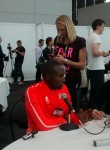Banned for life? Yeah, right. Not as long as there is money in this world and AK officials with pockets in their pants. Expect AK to make some of the usual noises about foreign agents, coaches, etc., and maybe even banning a few. But, that's all just fundraising activity. They will be reinstated just as they always have done just as soon as a little cash meets the palms of AK officials. Incompetent and corrupt to the core.
El Keniano wrote:
Disturbing now these Italians have taken to flinging mud at Kenya, portraying the system as rotten, since Rita's test results. Yet none was saying anything before. I feel a massive backlash coming against the whole Mafia and hopefully they'll be banned from working with Kenyan athletes for life.




